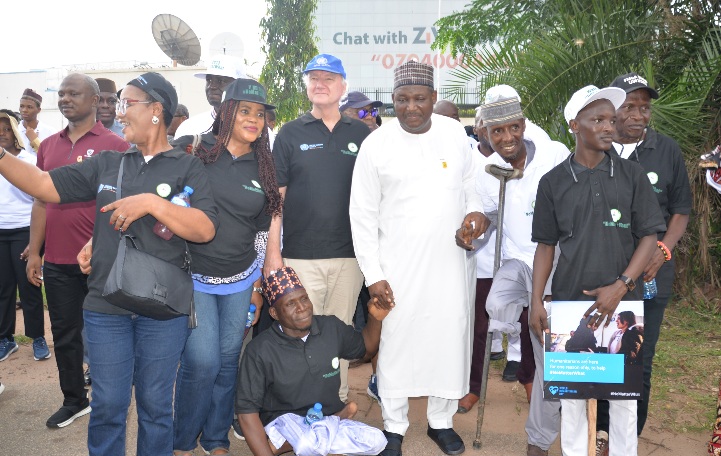The Federal Government on Friday showered encomium on frontline humanitarian workers across the country, despite daunting challenges that led to the death of some Aid Workers in the North-East region.
Permanent Secretary of Federal Ministry of Humanitarian Affairs, Disaster Management and Social Development, Dr. Nasir Sani-Gwarzo, gave the commendation in Abuja, during the commemoration of the 2023 World Humanitarian Day, which holds great significance within the realm of the humanitarian development peace nexus.
He however expressed grief over the tragic loss of 37 Aid Workers, with 24 wounded and 34 kidnapped in the North East of Nigeria.
According to the UNHCR Operating Data, about 3,578,966 Nigerians were displaced as at June 2023 in the North East, North West, and North Central regions of Nigeria.
He said: “This commemoration is a collaborative effort between the national and international humanitarian communities, united in celebrating the valiant efforts of aid workers who tirelessly extend their hands to individuals impacted by crises. World Humanitarian Day, observed annually on the 19th of August as designated by the United Nations, stands as a testament to their unwavering dedication.
“The essence of this year’s theme, #NoMatterWhat, encapsulates the profound essence of humanitarian action. The core principle that drives humanitarians is their steadfast commitment to extending life-saving assistance, irrespective of an individual’s identity or geographical location. Humanitarian workers stand as beacons of hope, traversing perilous paths to ensure aid reaches its intended recipients, regardless of the challenges they encounter.
“In recognizing that crises recognize no boundaries, humanitarians, too, acknowledge no barriers in their mission to assist those in dire need—No Matter What.
“It is paramount to acknowledge that frontline humanitarian workers are integral to the well-being of our nation. Their selfless endeavors amidst conflict zones and areas affected by natural disasters epitomize service to Nigeria. Their altruism not only ameliorates the conditions of those they assist but also contributes to the stability and prosperity of our nation.
“Regrettably, since 2016, the Aid Workers Security Database has recorded the tragic loss of 37 aid workers, with 24 wounded and 34 kidnapped in the North East of Nigeria. The current year has already witnessed the kidnapping of five aid workers in the North East, alongside similar incidents from various corners of our nation.
“As we gather here today to mark World Humanitarian Day, it is vital to acknowledge that countless individuals are grappling with humanitarian crises across Nigeria. These crises stem from diverse causes, ranging from insurgency and banditry to clashes between farmers and herders, compounded by the impacts of climate change.
“According to the UNHCR Operating Data, a staggering 3,578,966 internally displaced persons were recorded as of June 2023 in the North East, North West, and North Central regions of Nigeria. Families, venerable and resilient, find themselves navigating dire circumstances, often contending with acute needs such as sustenance, shelter, water, protection, and livelihoods.
“In the face of these challenges, both the Government of Nigeria and the entire humanitarian community have redoubled their efforts to provide meaningful responses. These endeavors are a testament to the resolute commitment of aid workers who persistently deliver assistance under the most challenging circumstances, embodying the essence of this year’s World Humanitarian Day theme.
“Recalling recent events, the federal government, under the visionary leadership of His Excellency Bola Ahmed Tinubu, has taken momentous strides in addressing food security, pricing, and sustainability. The declaration of a state of emergency on food security stands as a testament to the administration’s resolve.
“Furthermore, the Ministry has formulated policies and strategies aimed at fostering an enabling environment within the humanitarian sphere, facilitating seamless coordination and operation. These strategies are meticulously constructed through the lens of the humanitarian-development-peace nexus — a cohesive framework that underscores the interdependence of these fundamental pillars. The intricate details of these policies and strategies will be presented in the course of this briefing.
“In the spirit of collaboration and shared responsibility, I extend my heartfelt gratitude to our international partners for their continuous contributions and unwavering support. The steadfast efforts of humanitarian organizations further illuminate the path towards a better future.
“Acknowledging that the challenges posed by humanitarian crises transcend individual efforts, the Government remains resolute in its commitment to forging robust alliances with humanitarian actors. This commitment ensures the expeditious delivery of urgent assistance to those who need it most,” he noted.
On his part, United Nations Resident and Humanitarian Coordinator for Nigeria, Mr. Matthias Schmale, explained that this year’s World Humanitarian Day was organised to honour ail aid workers who step up each day to provide life-saving assistance to millions of people in North-East Nigeria and other parts of the country.
“Humanitarians on the frontline in North-East Nigeria work each day to ensure assistance is accessible to the most vulnerable women, children and men. No matter who they are or where they are, humanitarians are deeply committed to serving people in need.”
According to him, World Humanitarian Day is an occasion to advocate for the survival, well being and dignity of crisis-affected people and for the safety and security of aid workers.
“Today members of the humanitarian community gathered to mark World Humanitarian Day with a solidarity walk in Abuja. Throughout the North-East, people are commemorating the day with events that bring people together to honour aid workers and shine a light on the barriers they face to do their work.
“On a number of occasions I have seen for myself how hard humanitarians in North-East Nigeria are working in extremely difficult circumstances, often risking their fives and safety to support people in need,” stated Mr. Schmale.
Since 2016, 37 aid workers have been killed in Borno, Adamawa and Yobe (BAY) states, according to the Aid Worker Security Database. Additionally, 24 have been wounded and 34 kidnapped.
“The courage, dedication and perseverance of national and international aid workers on the front line who deliver no matter what is deeply impressive,” said Mr. Schmaie.
The UN and its partners aim to assist six million people in North-East Nigeria through the 2023 Humanitarian Response Plan (HRP), and additional funding is urgently needed.
The plan appealed for USD$1.3 billion but is currently only 29 per cent funded. The deteriorating food security and nutrition situation is one of the most alarming aspects of the crisis in the north-east.
“An estimated 4.3 million people are food insecure in the BAY states, according to the March 2023 Cadre Harmonisé assessment. Some two million children under five are likely to face acute malnutrition this year.
“To urgently operationalize time-sensitive and critical activities, the United Nations and partners launched a $396 million Lean Season Multi-Sector Plan as part of the MRP.
“While partners have made significant progress, including reaching approximately 2.1 million people with food assistance, they are challenged by limited funding, as this prioritised plan is only 51 per cent funded.
Despite facing tremendous difficulties, aid workers persist each day, standing shoulder to shoulder with affected communities. “On this day, and every day, I salute the commitment and perseverance of humanitarian workers,” said Mr. Schmale. “No matter what, the humanitarian community will continue to work together in support of government and other key actors to save, protect, and improve lives.”
READ ALSO FROM NIGERIAN TRIBUNE
WATCH TOP VIDEOS FROM NIGERIAN TRIBUNE TV
- Let’s Talk About SELF-AWARENESS
- Is Your Confidence Mistaken for Pride? Let’s talk about it
- Is Etiquette About Perfection…Or Just Not Being Rude?
- Top Psychologist Reveal 3 Signs You’re Struggling With Imposter Syndrome
- Do You Pick Up Work-Related Calls at Midnight or Never? Let’s Talk About Boundaries







